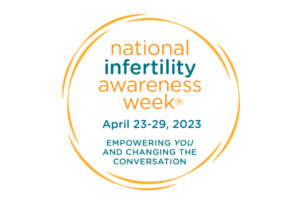Join our Newport Beach fertility doctors in recognizing NIAW, National Infertility Awareness Week
 For couples and individuals struggling to conceive, infertility can cast a dark cloud over their lives. Robert Anderson MD and Don Royster MD, our Newport Beach fertility doctors, want to support the millions of men and women in this country dealing with infertility. National Infertility Awareness Week, or NIAW, occurs during the last full week of April. This week and every week, we recognize that our patients face a difficult journey with infertility.
For couples and individuals struggling to conceive, infertility can cast a dark cloud over their lives. Robert Anderson MD and Don Royster MD, our Newport Beach fertility doctors, want to support the millions of men and women in this country dealing with infertility. National Infertility Awareness Week, or NIAW, occurs during the last full week of April. This week and every week, we recognize that our patients face a difficult journey with infertility.
The Southern California Center for Reproductive Medicine team offers unwavering support to our patients
When you want to have a baby and can’t, you may feel discouraged and alone. We understand that struggling to conceive creates a difficult burden, especially if friends and family seem to easily begin or expand their families. Our team is committed to walking with you each step of the way, until you achieve your dreams of parenthood.
Debunking common misconceptions about infertility
Our Newport Beach fertility doctors want to utilize NIAW to provide education about infertility. Understanding the truth about infertility enables you to support friends and family who may be struggling to conceive. There are many myths about infertility, and we hope to dispel some of the most common myths by providing accurate information.
Myth: Just relax, and you will get pregnant.
Fact: Just like diabetes or high cholesterol, infertility is a medical condition. No amount of relaxation or stress relief can address common causes of infertility, such as hormone imbalances, physical abnormalities, blockages and other reproductive problems.
Myth: Getting pregnant again once you have had a baby will be no problem.
Fact: A prior healthy pregnancy does not guarantee future success. Some women experience secondary infertility, which experts define as the inability to conceive or carry a pregnancy after delivering a child.
Myth: Infertility is mostly a female problem.
Fact: Actually, infertility affects both men and women. Roughly one-third of the time, couples’ inability to conceive is related to female infertility, with another one-third of cases tied to male factor infertility. The final third of cases are a combination of male and female fertility issues, or have an unidentified cause.
Myth: Age doesn’t affect fertility.
Fact: Both women and men can see fertility decrease as they age. Women are born with all the eggs they will ever have. With age, the quality and quantity of those eggs declines. For men, the volume and health of sperm drops with age, so conceiving as you get older can become more difficult.
For those dealing with infertility, we want to use NIAW 2023 to celebrate your strength and recognize your struggle. Call our office for more information or to schedule an appointment with our Newport Beach fertility doctors